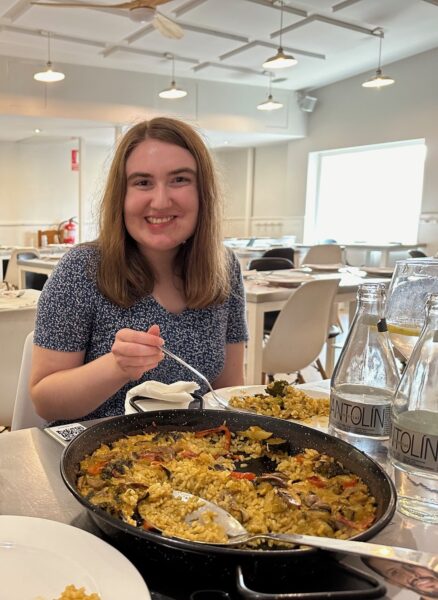28
Experiencing new foods is an important part of traveling or studying abroad, but how does this work when you live with dietary restrictions? With some simple pre-travel research and planning while you’re abroad, you can safely enjoy the local cuisine.
As a study abroad student with celiac disease (extreme gluten intolerance), here are some tips on managing food restrictions in another country.
(Note: This article is general information based on personal lived experience and is not intended to be medical advice.)
Preparing to Manage Food Restrictions Before You Go
Before you leave your home country, you’ll want to do some research to set yourself up for success during your time abroad.
Research Your Dining Situation
First, notify your study abroad program of any dietary restrictions as soon as possible. Be sure to also note any medically necessary food restrictions on your medical forms. Talk with the program about how you’ll be getting your regular meals. For example, will you have access to a kitchen to prepare your own food or be dining in a dorm cafeteria?
Research the food labeling laws of your destination country. Different countries have different rules for what is listed on a food label and even what is considered a “common allergen.” For example, Spain requires any ingredients derived from the grains wheat, barley, rye, and oats to be clearly labeled with the common name of the grain, while the U.S. only requires this for ingredients derived from the grain wheat. The standards companies must use for food labels such as “nut free” or “gluten free” or “manufactured in the same facility as…” can also vary between nations. Some places may have a society for certain health conditions or food restrictions (like the Federación de Asociaciones de Celiacos de España for celiac disease in Spain), and their website can be a good source of information on how to read food labels.
Prepare to Communicate Your Dietary Restrictions
Prepare to communicate about your food restrictions with others. Even if you are going to a country where your native language is the primary language, you should research dialect differences (e.g., “celiac” is “coeliac” in Britain). You’ll also want to learn about the culture surrounding your dietary restriction and how aware the general populace is of it before you go.

Before I went to study in Spain, I prepared a reference sheet for myself with all the vocabulary I would need for reading food labels and phrases for discussing my food needs with others. I also prepared a more detailed restaurant card to show to restaurant staff and anyone else preparing food for me. I recommend making these for yourself and keeping both on you at all times even if you know the language. You never know when your mind will go blank, or when you’ll need to show someone a written version because they don’t understand your pronunciation. Also, have electronic copies you can access in case you lose the paper ones.
For the reference sheet, write down what your dietary restriction is called in your destination country and how to tell someone you have it (e.g., “I have celiac disease/a gluten allergy” = “Soy celiaco/a”). Also write down the translations of the names of ingredients and foods you can’t have, as well as any other terms you’ll need to know for reading food labels. You’ll also want to write how to ask about things like shared cooking equipment or kitchen utensils if you’re sensitive to cross-contamination.
For the restaurant card, have a full explanation of your dietary restrictions (including mentioning if they are for medical reasons), foods you can’t have, examples of foods you can have, and a notice to avoid shared kitchen equipment if you’re sensitive to cross-contamination. You can often find these pre-made online on travel blogs or the websites of societies for people with specific dietary restrictions, though some websites require you to pay for them (Coeliac Youth of Europe offers free travel restaurant cards for those who can’t eat gluten for most European countries). If you can’t find a pre-made card, you could ask someone proficient in the language of your destination, such as a study abroad program staff member or professor at your university, for help.
Know Customs Rules for Food
Finally, if you’re bringing any food from home with you, you’ll want to check customs regulations for your destination and anywhere you’re passing through on the way. Most countries have rules about what types of food can and can’t be brought in from abroad. These rules vary greatly from place to place and change over time, so make sure your information is recent and specific to your itinerary.
Managing Dietary Restrictions While You’re Abroad

Now that you’re done with the prep work, you’re ready to enjoy your trip! Here’s a few more tips on how to eat abroad with minimal stress.
Communicate with Who You’re Living With
As soon as possible, tell your roommates or host family about your food restrictions (use the phrase sheet and/or restaurant card if needed) and discuss how you’ll manage them. For example, since I shared an apartment kitchen with other students, I kept my groceries separate from everyone else’s and did my own food prep.
Explore and Research Dining Options
As for finding food, be open to exploring. Take some time to scout out the selections of local grocery stores for safe foods you can easily prepare. You may even find some pre-made, allergy/dietary-restriction-friendly versions of local specialties like I did!
Research restaurants in your area. In many cities, it’s customary for restaurants to post their menus (sometimes with allergen information) outside. You can also find restaurants with safe menu options online on travel blogs or specialty review websites like FindMeGlutenFree. I found lots of great celiac-safe restaurants and bakeries in Spain through internet research. Try googling your food restriction and city (e.g., “gluten free Granada”). Don’t be afraid to dine alone or to go to a different restaurant than other students if it means a better chance at a safe and delicious meal. And of course, always inform your server of your dietary restrictions before you begin ordering.
Finally, carry a spare snack or two in case you end up somewhere without a safe food option while out and about.
Final Thoughts on Studying Abroad with Dietary Restrictions
Studying abroad with food restrictions can be daunting, but it’s possible to enjoy new flavors without compromising your well-being. With research, planning, and communication, you can safely sample the local cuisine during your travels.
Source link
All Materials on this website/blog are only for Learning & Educational purposes. It is strictly recommended to buy the products from the original owner/publisher of these products. Our intention is not to infringe any copyright policy. If you are the copyright holder of any of the content uploaded on this site and don’t want it to be here. Instead of taking any other action, please contact us. Your complaint would be honored, and the highlighted content will be removed instantly.
